Healthy Eating for Seniors - Canada’s Food Guide
Source: https://food-guide.canada.ca/en/
Healthy eating plays a crucial role in aging well, contributing to your overall health, independence, and quality of life. As we grow older, maintaining proper nutrition is key to preventing chronic diseases, maintaining energy levels, and promoting physical well-being.
According to Canada’s Food Guide, eating well helps to:
Protect health and well-being by providing essential nutrients.
Prevent or lower the risk of chronic conditions like heart disease and type 2 diabetes.
Maintain muscle and bone health, which can help reduce the risk of falls and fractures.
Challenges to Healthy Eating with Age
According to Canada’s Food Guide, as we age, changes in body function, lifestyle, and health can make eating healthy seem more difficult. These changes may include:
Reduced appetite or altered sense of taste and smell.
It is important to understand if there are any underlying medical reasons behind appetite loss, before looking into any social and circumstantial reasons. In this article, we will further explore the social reasons behind appetite loss.
Difficulty chewing, swallowing, or digesting food.
Limited ability to shop for or prepare meals.
Financial constraints or eating alone more often.
These factors can make healthy eating seem like a challenge, but it doesn’t have to be. Before diving into the practical tips listed by Canada’s Food Guide to help you continue eating well as you age, we will look into the reasons why appetite may be on the decline as we age.
Exploring Reduced Appetite from a Routine and Psychological Standpoint (a Carebee view)
As mentioned above, it is important to understand if there are any underlying medical reasons behind appetite loss, before looking into any social and circumstantial reasons. With that said, we would like to address some common social reasons that we can all start becoming aware of for our loved ones, friends and family and make a change today.
Loneliness or depression: we are social beings, and dining alone can simply be ‘not as fun’. We’ve all had those moments where we didn’t deem it worthy to cook “just for one” and ended up eating scraps or left overs. If you have any family members living alone, join them for dinner once a week and if possible why not bond over putting a meal together? Doing things together is simply fun and stimulates our senses, such as appetite.
Lack of physical exercise: movement helps our bodies burn calories and thus boost metabolism. We are no doctors, but that is bound to create some movement in the body and hopefully result in hunger. Where mobility is a challenge, activities such as chair yoga or simple movements such as minor stretching can only do us good! Mental work also counts (our non-expert opinion!). Have you ever done a crossword puzzle and felt hungry after? We have!
Daily Routines (or lack thereof): we have all been there, working long days and having to eat lunch at set times because of work or other engagements. Sometimes anchors we’ve had for many years may no longer be there to remind us of when it’s time to eat - such as the loss of a partner who helped put together dinner or simply was a foodie, resulting in forgetting to eat. It’s important to build self-care routines and make food a conscious and planned-out part of our day and week. Invite friends who can help share the burden, leverage grocery delivery applications or ready meal companies and set routine deliveries so you always have something there for you! Remember, we all need fuel to function (and sometimes a little bit of dark chocolate - in our case, most days!).
Healthy Eating Tips According to Canada’s Food Guide
Enjoy a Variety of Foods: Include a wide range of vegetables, fruits, whole grains, and protein sources like beans, fish, and lean meats. This ensures you’re getting the nutrients you need to stay healthy.
Hydrate Regularly: Even though your sense of thirst may decline with age, it’s important to drink water regularly. You can also hydrate with lower-fat milk, soups, or fruits and vegetables with high water content.
Cook and Shop for One or Two: If you’re cooking for just one or two people, meal planning and cooking in bulk can save time and reduce waste. Preparing meals in advance or alternating cooking with a friend can make the task easier.
Eat with Others: Socializing during meals can enhance the eating experience and encourage better nutrition. Joining community lunch programs or inviting family and friends over can provide both companionship and health benefits.
Build an Emergency Food Supply: Stocking up on non-perishable foods like canned beans, pasta, and rice can ensure you always have healthy options on hand, even when you can’t make it to the store.
Healthy eating is essential for maintaining good health as you age. It not only helps prevent diseases like heart disease and diabetes but also supports overall well-being and independence. With a little planning and the right resources, eating well can be simple and rewarding, no matter your age.
For more information, visit Canada's Food Guide here and the ‘Healthy Eating for Seniors’ page here.


